【2015中考复习方案】(新课标·北京)2015届九年级英语复习语法专题突破课件:语法互动八 系动词和情态动词(共17张PPT)
文档属性
| 名称 | 【2015中考复习方案】(新课标·北京)2015届九年级英语复习语法专题突破课件:语法互动八 系动词和情态动词(共17张PPT) |
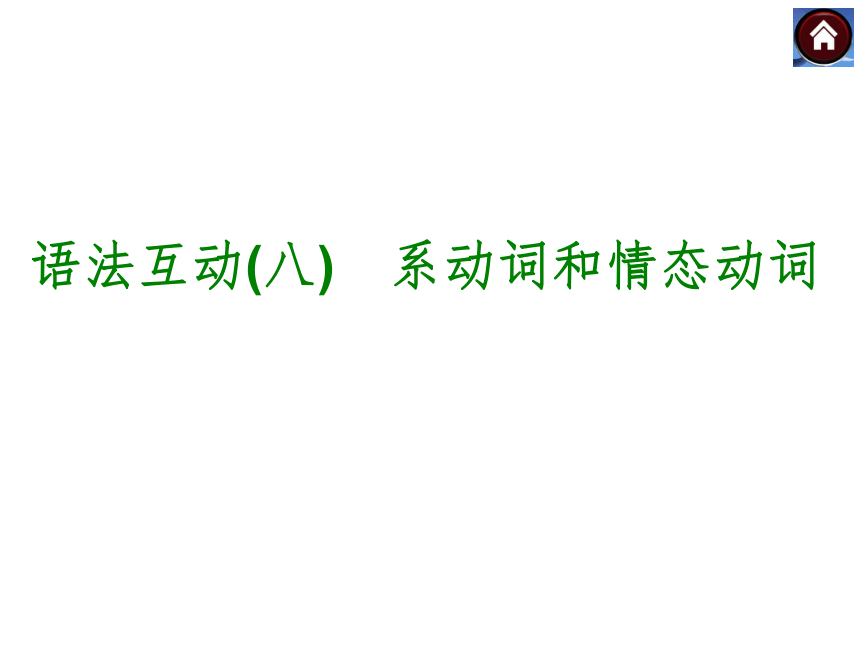
|
|
| 格式 | zip | ||
| 文件大小 | 42.2KB | ||
| 资源类型 | 教案 | ||
| 版本资源 | 人教新目标(Go for it)版 | ||
| 科目 | 英语 | ||
| 更新时间 | 2015-01-07 08:13:34 | ||
图片预览

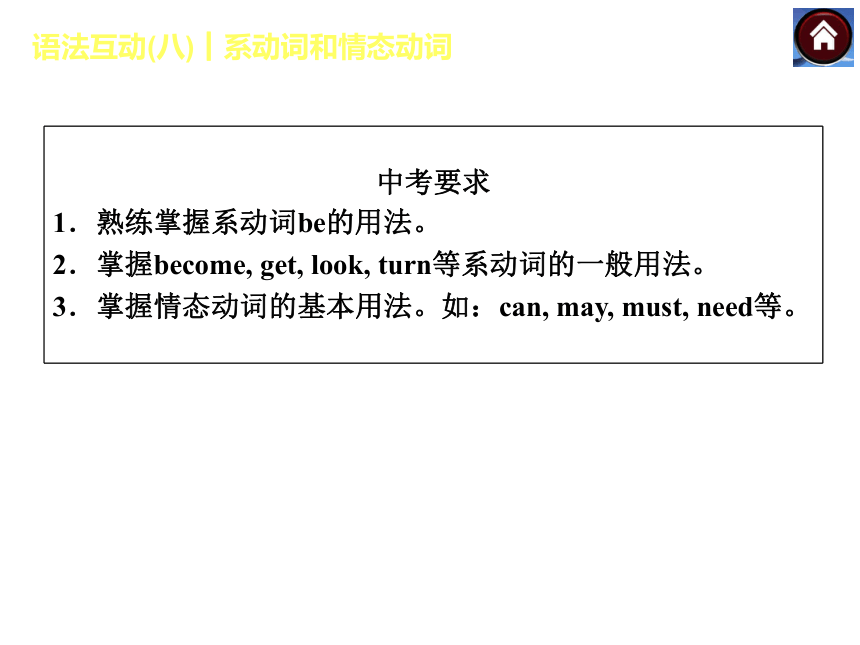
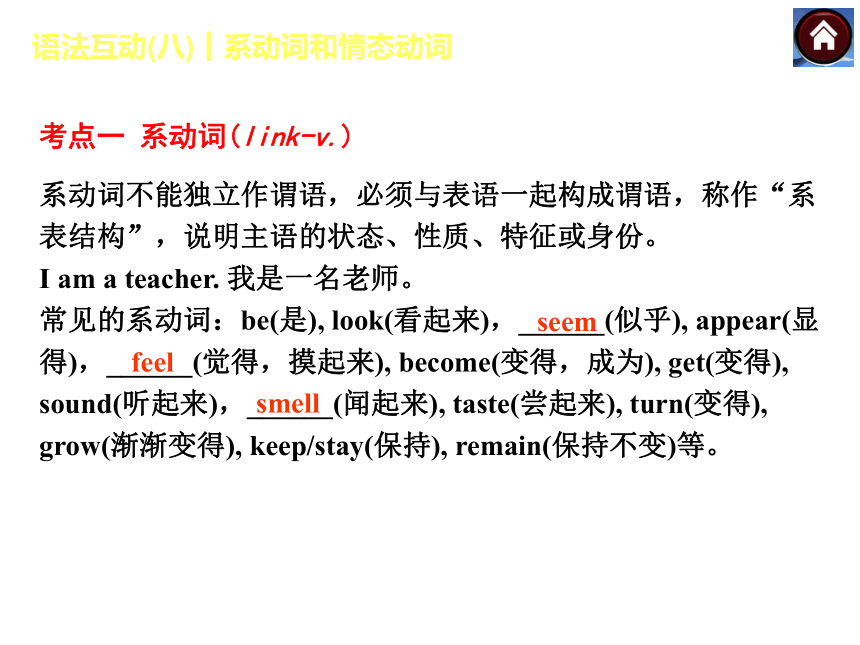
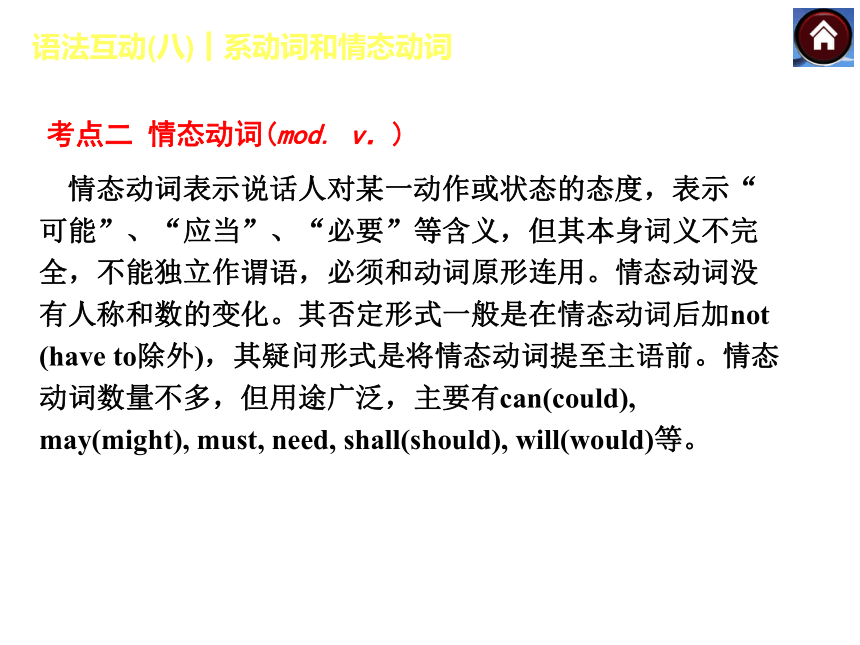
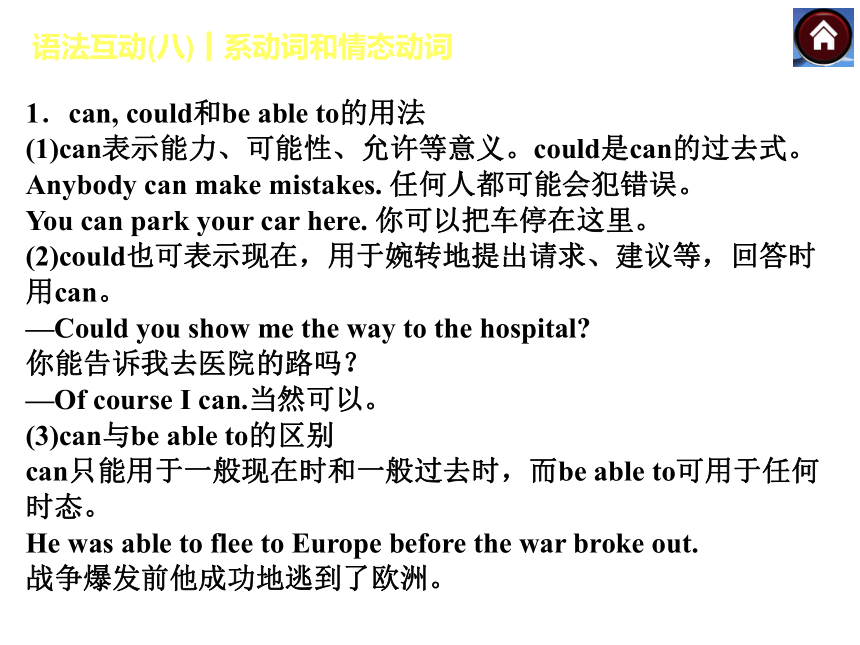
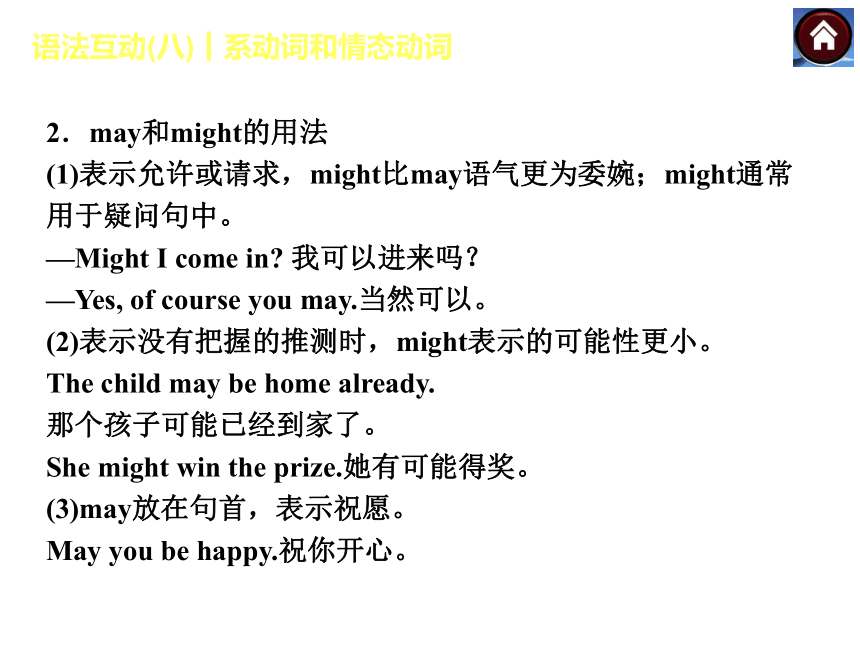
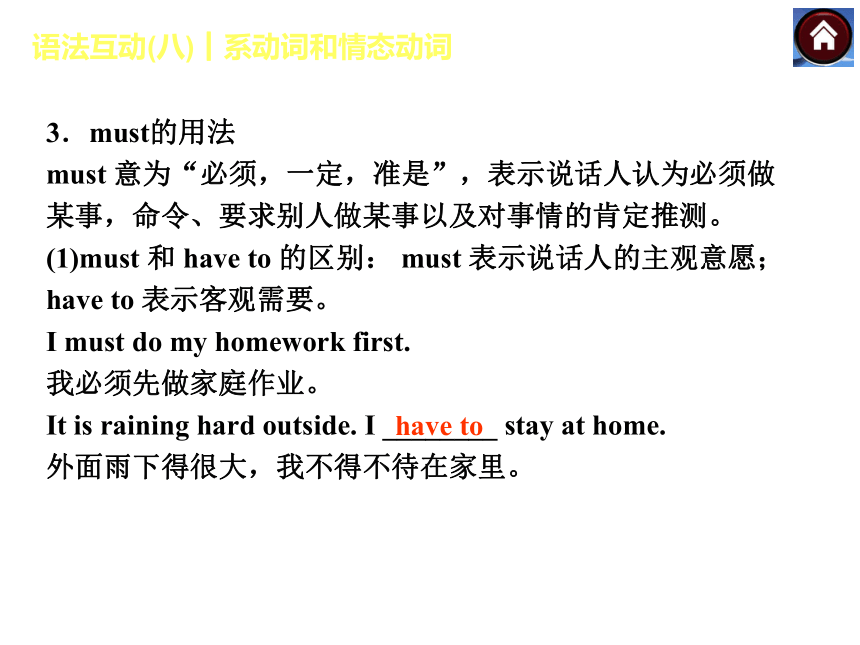
文档简介
课件17张PPT。语法互动(八) 系动词和情态动词语法互动(八)┃系动词和情态动词中考要求
1.熟练掌握系动词be的用法。
2.掌握become, get, look, turn等系动词的一般用法。
3.掌握情态动词的基本用法。如:can, may, must, need等。系动词不能独立作谓语,必须与表语一起构成谓语,称作“系表结构”,说明主语的状态、性质、特征或身份。
I am a teacher. 我是一名老师。
常见的系动词:be(是), look(看起来),______(似乎), appear(显得),______(觉得,摸起来), become(变得,成为), get(变得), sound(听起来),______(闻起来), taste(尝起来), turn(变得), grow(渐渐变得), keep/stay(保持), remain(保持不变)等。 seem feel 语法互动(八)┃系动词和情态动词考点一 系动词(link-v.) smell语法互动(八)┃系动词和情态动词考点二 情态动词(mod. v.) 情态动词表示说话人对某一动作或状态的态度,表示“可能”、“应当”、“必要”等含义,但其本身词义不完全,不能独立作谓语,必须和动词原形连用。情态动词没有人称和数的变化。其否定形式一般是在情态动词后加not (have to除外),其疑问形式是将情态动词提至主语前。情态动词数量不多,但用途广泛,主要有can(could), may(might), must, need, shall(should), will(would)等。1.can, could和be able to的用法
(1)can表示能力、可能性、允许等意义。could是can的过去式。
Anybody can make mistakes. 任何人都可能会犯错误。
You can park your car here. 你可以把车停在这里。
(2)could也可表示现在,用于婉转地提出请求、建议等,回答时用can。
—Could you show me the way to the hospital?
你能告诉我去医院的路吗?
—Of course I can.当然可以。
(3)can与be able to的区别
can只能用于一般现在时和一般过去时,而be able to可用于任何时态。
He was able to flee to Europe before the war broke out.
战争爆发前他成功地逃到了欧洲。语法互动(八)┃系动词和情态动词2.may和might的用法
(1)表示允许或请求,might比may语气更为委婉;might通常用于疑问句中。
—Might I come in? 我可以进来吗?
—Yes, of course you may.当然可以。
(2)表示没有把握的推测时,might表示的可能性更小。
The child may be home already.
那个孩子可能已经到家了。
She might win the prize.她有可能得奖。
(3)may放在句首,表示祝愿。
May you be happy.祝你开心。语法互动(八)┃系动词和情态动词3.must的用法
must 意为“必须,一定,准是”,表示说话人认为必须做某事,命令、要求别人做某事以及对事情的肯定推测。
(1)must 和 have to 的区别: must 表示说话人的主观意愿;have to 表示客观需要。
I must do my homework first.
我必须先做家庭作业。
It is raining hard outside. I ________ stay at home.
外面雨下得很大,我不得不待在家里。语法互动(八)┃系动词和情态动词have to (2)回答must提问的答语
①肯定回答:Yes,…must.
—Must I go home now?我必须现在回家吗?
—Yes, you must. 是的,你必须回家。
②否定回答:No,…needn't./No,…don't/doesn't have to.
—Must I go home now? 我必须现在回家吗?
—No, you _____________________. 不,不必。语法互动(八)┃系动词和情态动词needn't/don't have to 4.need的用法
(1)need 表示“需要”,主要用于否定句和疑问句中。其否定形式为needn't,表示“没有必要,不必”;用need 提问时,肯定回答用must,否定回答用 needn't。
—Need we do some cleaning now?
我们需要现在大扫除吗?
—Yes, you must./No, you needn't.
是的,你们必须。/不,你们不必。
(2)need 还可当作实义动词使用,常用于“need to do sth.”结构。
I need to learn more. 我需要学习更多。语法互动(八)┃系动词和情态动词5.shall和should的用法
shall 用于第一人称的句子中,表示提建议或请求; should用于各种人称的句子中,强调义务或责任。
______ we go out for a walk?
我们出去散步好吗?(建议)
You should study hard at school.
你们在学校应该努力学习。(劝告)语法互动(八)┃系动词和情态动词Shall 6.will和would的用法
will用于第二人称的疑问句时,表示征求意见或提建议。would 为 will 的过去式,可用于多种人称,表示意愿。
Will you have a little soup?
你要不要喝点汤?语法互动(八)┃系动词和情态动词7.归纳:情态动词表推测的用法
(1)肯定句中一般用must(一定),may(可能),might/could(也许,或许),其中must表推测的语气最强,其余依次减弱。
The book must be hers. Her name is on it.
这本书一定是她的,她的名字在上面。
He must be running.他一定在跑步。
They may know the way to the library.
他们可能知道去图书馆的路。语法互动(八)┃系动词和情态动词(2)否定句中一般用can't/couldn't(不可能)。
That man can't be Mr. Li, because he has gone to London.
那个人不可能是李老师,因为他去伦敦了。
(3)疑问句中用can/could(能)。
—Can the red sweater be Tom's?
这件红毛衣会是汤姆的吗?
—No, it can't. He can't stand red.
不,不可能。他不能忍受红色。
[注意] 在表示婉转地提出请求、想法、建议等或用于疑问及否定句表示惊讶、不相信等时,might,could不是may,can的过去式。语法互动(八)┃系动词和情态动词Ⅰ.根据汉语提示完成句子
1.She ___________ (感到开心) when she saw her grandparents
yesterday.
2.—Must I finish the work now?
—No, you ____________________ (不必).
3.I think you ________________ (一定饿了). I'll cook dinner
for you.
4.—Peter, is the dictionary Mary's?
—No, it ________________ (不可能是她的). Her dictionary
is at home.
5.—Could I have a look at your photos?
—Yes, you ______ (能).考点过关 felt happy needn't/don't have to must be hungry can't be hers can 语法互动(八)┃系动词和情态动词Ⅱ.单项填空
1.Oh, it ________ so nice. What beautiful music it is!
A.smells B.sounds C.tastes D.looks
2.I really enjoy the noodles and vegetables. They ________
delicious.
A.stay B.feel C.taste D.sound
3.—Where are you going this month?
—We ________ go to Hangzhou, but we're not sure.
A.needn't B.must C.might D.mustn't
4.—May I go out for a while, Mom?
—No, you ________.You have to finish your homework first.
A.shouldn't B.needn't
C.can't D.won'tB C C C 语法互动(八)┃系动词和情态动词5.Students in our school ________ know shouting is not
allowed in the library.
A.can B.may
C.must D.need
6.The woman who is talking with Mr. Brown ________ be
Miss Li. She has gone to England.
A.can't B.must
C.may D.mustn't
7.—Can I borrow your ruler, please?
—Yes, you ________.But you must return it to me before
lunchtime.
A.have to B.can
C.must D.couldC A B 语法互动(八)┃系动词和情态动词8.—Dad, must we wait until the light becomes green?
—Yes, I'm afraid we ________. That's the traffic rule.
A.can B.may C.have to D.need
9.—________ I do the report by myself?
—No, you needn't. You can ask for help.
A.Must B.Need C.Can D.Should
10.Finish your homework first, then you'll ________ watch
TV for an hour.
A.can B.be able to
C.able D.couldC A B 语法互动(八)┃系动词和情态动词
1.熟练掌握系动词be的用法。
2.掌握become, get, look, turn等系动词的一般用法。
3.掌握情态动词的基本用法。如:can, may, must, need等。系动词不能独立作谓语,必须与表语一起构成谓语,称作“系表结构”,说明主语的状态、性质、特征或身份。
I am a teacher. 我是一名老师。
常见的系动词:be(是), look(看起来),______(似乎), appear(显得),______(觉得,摸起来), become(变得,成为), get(变得), sound(听起来),______(闻起来), taste(尝起来), turn(变得), grow(渐渐变得), keep/stay(保持), remain(保持不变)等。 seem feel 语法互动(八)┃系动词和情态动词考点一 系动词(link-v.) smell语法互动(八)┃系动词和情态动词考点二 情态动词(mod. v.) 情态动词表示说话人对某一动作或状态的态度,表示“可能”、“应当”、“必要”等含义,但其本身词义不完全,不能独立作谓语,必须和动词原形连用。情态动词没有人称和数的变化。其否定形式一般是在情态动词后加not (have to除外),其疑问形式是将情态动词提至主语前。情态动词数量不多,但用途广泛,主要有can(could), may(might), must, need, shall(should), will(would)等。1.can, could和be able to的用法
(1)can表示能力、可能性、允许等意义。could是can的过去式。
Anybody can make mistakes. 任何人都可能会犯错误。
You can park your car here. 你可以把车停在这里。
(2)could也可表示现在,用于婉转地提出请求、建议等,回答时用can。
—Could you show me the way to the hospital?
你能告诉我去医院的路吗?
—Of course I can.当然可以。
(3)can与be able to的区别
can只能用于一般现在时和一般过去时,而be able to可用于任何时态。
He was able to flee to Europe before the war broke out.
战争爆发前他成功地逃到了欧洲。语法互动(八)┃系动词和情态动词2.may和might的用法
(1)表示允许或请求,might比may语气更为委婉;might通常用于疑问句中。
—Might I come in? 我可以进来吗?
—Yes, of course you may.当然可以。
(2)表示没有把握的推测时,might表示的可能性更小。
The child may be home already.
那个孩子可能已经到家了。
She might win the prize.她有可能得奖。
(3)may放在句首,表示祝愿。
May you be happy.祝你开心。语法互动(八)┃系动词和情态动词3.must的用法
must 意为“必须,一定,准是”,表示说话人认为必须做某事,命令、要求别人做某事以及对事情的肯定推测。
(1)must 和 have to 的区别: must 表示说话人的主观意愿;have to 表示客观需要。
I must do my homework first.
我必须先做家庭作业。
It is raining hard outside. I ________ stay at home.
外面雨下得很大,我不得不待在家里。语法互动(八)┃系动词和情态动词have to (2)回答must提问的答语
①肯定回答:Yes,…must.
—Must I go home now?我必须现在回家吗?
—Yes, you must. 是的,你必须回家。
②否定回答:No,…needn't./No,…don't/doesn't have to.
—Must I go home now? 我必须现在回家吗?
—No, you _____________________. 不,不必。语法互动(八)┃系动词和情态动词needn't/don't have to 4.need的用法
(1)need 表示“需要”,主要用于否定句和疑问句中。其否定形式为needn't,表示“没有必要,不必”;用need 提问时,肯定回答用must,否定回答用 needn't。
—Need we do some cleaning now?
我们需要现在大扫除吗?
—Yes, you must./No, you needn't.
是的,你们必须。/不,你们不必。
(2)need 还可当作实义动词使用,常用于“need to do sth.”结构。
I need to learn more. 我需要学习更多。语法互动(八)┃系动词和情态动词5.shall和should的用法
shall 用于第一人称的句子中,表示提建议或请求; should用于各种人称的句子中,强调义务或责任。
______ we go out for a walk?
我们出去散步好吗?(建议)
You should study hard at school.
你们在学校应该努力学习。(劝告)语法互动(八)┃系动词和情态动词Shall 6.will和would的用法
will用于第二人称的疑问句时,表示征求意见或提建议。would 为 will 的过去式,可用于多种人称,表示意愿。
Will you have a little soup?
你要不要喝点汤?语法互动(八)┃系动词和情态动词7.归纳:情态动词表推测的用法
(1)肯定句中一般用must(一定),may(可能),might/could(也许,或许),其中must表推测的语气最强,其余依次减弱。
The book must be hers. Her name is on it.
这本书一定是她的,她的名字在上面。
He must be running.他一定在跑步。
They may know the way to the library.
他们可能知道去图书馆的路。语法互动(八)┃系动词和情态动词(2)否定句中一般用can't/couldn't(不可能)。
That man can't be Mr. Li, because he has gone to London.
那个人不可能是李老师,因为他去伦敦了。
(3)疑问句中用can/could(能)。
—Can the red sweater be Tom's?
这件红毛衣会是汤姆的吗?
—No, it can't. He can't stand red.
不,不可能。他不能忍受红色。
[注意] 在表示婉转地提出请求、想法、建议等或用于疑问及否定句表示惊讶、不相信等时,might,could不是may,can的过去式。语法互动(八)┃系动词和情态动词Ⅰ.根据汉语提示完成句子
1.She ___________ (感到开心) when she saw her grandparents
yesterday.
2.—Must I finish the work now?
—No, you ____________________ (不必).
3.I think you ________________ (一定饿了). I'll cook dinner
for you.
4.—Peter, is the dictionary Mary's?
—No, it ________________ (不可能是她的). Her dictionary
is at home.
5.—Could I have a look at your photos?
—Yes, you ______ (能).考点过关 felt happy needn't/don't have to must be hungry can't be hers can 语法互动(八)┃系动词和情态动词Ⅱ.单项填空
1.Oh, it ________ so nice. What beautiful music it is!
A.smells B.sounds C.tastes D.looks
2.I really enjoy the noodles and vegetables. They ________
delicious.
A.stay B.feel C.taste D.sound
3.—Where are you going this month?
—We ________ go to Hangzhou, but we're not sure.
A.needn't B.must C.might D.mustn't
4.—May I go out for a while, Mom?
—No, you ________.You have to finish your homework first.
A.shouldn't B.needn't
C.can't D.won'tB C C C 语法互动(八)┃系动词和情态动词5.Students in our school ________ know shouting is not
allowed in the library.
A.can B.may
C.must D.need
6.The woman who is talking with Mr. Brown ________ be
Miss Li. She has gone to England.
A.can't B.must
C.may D.mustn't
7.—Can I borrow your ruler, please?
—Yes, you ________.But you must return it to me before
lunchtime.
A.have to B.can
C.must D.couldC A B 语法互动(八)┃系动词和情态动词8.—Dad, must we wait until the light becomes green?
—Yes, I'm afraid we ________. That's the traffic rule.
A.can B.may C.have to D.need
9.—________ I do the report by myself?
—No, you needn't. You can ask for help.
A.Must B.Need C.Can D.Should
10.Finish your homework first, then you'll ________ watch
TV for an hour.
A.can B.be able to
C.able D.couldC A B 语法互动(八)┃系动词和情态动词
同课章节目录
- 词法
- 名词
- 动词和动词短语
- 动词语态
- 动词时态
- 助动词和情态动词
- 非谓语动词
- 冠词
- 代词
- 数词和量词
- 形容词副词及其比较等级
- 介词和介词短语
- 连词和感叹词
- 构词法
- 相似、相近词比较
- 句法
- 陈述句
- 一般疑问句和否定疑问句
- 特殊疑问句及选择疑问句
- 反意疑问句
- 存在句(There be句型)
- 宾语从句
- 定语从句
- 状语从句
- 主谓一致问题
- 简单句
- 并列句
- 复合句
- 主谓一致
- 主、表语从句
- 名词性从句
- 直接引语和间接引语
- 虚拟语气
- 感叹句
- 强调句
- 倒装句
- 祈使句
- 句子的成分
- 句子的分类
- 题型专区
- 单项选择部分
- 易错题
- 完形填空
- 阅读理解
- 词汇练习
- 听说训练
- 句型转换
- 补全对话
- 短文改错
- 翻译
- 书面表达
- 任务型阅读
- 语法填空
- 其他资料
